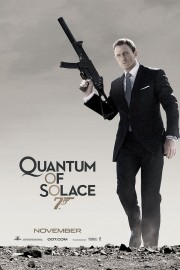Quantum of Solace
After 46 years and 22 films, British super spy James Bond has starred in his first sequel. With “Quantum of Solace,” the filmmakers behind the venerable franchise have struck on a new direction by creating a direct continuation to the story of 2006’s Bond reboot “Casino Royale,” which introduced live-wire actor Daniel Craig in the role by making a bond rough around the edges, and in the middle of discovering himself. “Solace” continues the reinvention by having him go rogue, yet maintain that suave charisma people love in the character, be it in the star shine of Pierce Brosnan or Sean Connery, or the left-turn of a Roger Moore or Timothy Dalton. Two films in, I’m loving this new Bond. Now it’s time to see how he does in stand-alone adventures.
“Quantum of Solace” hits the ground running, with 007 on a high-speed chase in Italy with the man he went to visit at the end of “Casino Royale,” a lead in his search to find the people who murdered his love Vesper Lynd (Eva Green). But things are never that simple- he’s got some guns on his trail, though he manages to lose them in the most exciting opening to an action movie since “Lethal Weapon 2.” He brings his cargo to the rendezvous, where M (Dame Judi Dench- you mean she hasn’t always played this role?) and other colleagues at MI-6 are ready to interrogate him. But it’s not as simple as all that. No sooner are they getting answers do Bond and co. have more questions to get answered, leading to a greater threat that is so covert, they’ve even infiltrated MI-6. It’s not long before Bond is killing every lead, but not before they lead him to Haiti and a conspiracy to bring military rule to Bolivia. It’s a long story…
…well, if you’ve seen the running time, it’s really not. At around 100 minutes, this is the shortest Bond film ever. Not that the story really requires it to be any longer- screenwriters Paul Haggis, Neal Purvis, and Robert Wade (all of whom worked on “Royale”) are breaking from a great many traditions in the past two Bond movies, especially in this one. Moneypenny is nowhere to be found at MI-6 (Hell, Bond doesn’t really show up there even). Bond and M have long-distance conversations; actually, they barely talk much at all. And gone this time are the sensual and PG-13 erotic love scenes with the Bond girls; OK, we do see a sufficient scene with handler Agent Fields (Gemma Arterton, a first-class hottie in the Bond lexicon), but main Bond girl Camille (“Max Payne’s” Olga Kurylenko) is less interested in getting into Bond’s bed than she is in getting revenge against the Bolivian general who murdered her father. Well, that’s one think her and Bond have in common. And what part does Dominic Greene (a devious, though not classically evil, Mathieu Amalric) play in matters? I’ll let the film try and sort that out for you.
In terms of traditional Bond, this entry feels more at home in the Bourne universe than the Bond one- the story isn’t classic Bond per se (and neither are the villains and babes, or their names), which “Casino Royale” managed brilliantly while also reinventing the franchise and reinvigorating it. Director Marc Forster (a versatile talent responsible for “Finding Neverland,” “Monster’s Ball,” “Stay,” “Stranger Than Fiction,” and “The Kite Runner”) was an odd, auteurish choice to bring into the series (most directors in the franchise are nondistinct in their approach to the material), but he delivers the action goods with the best of them, and keeps the storyline intriguing. In fact, I would say that this is the most classic Bond we’ve seen since Brosnan’s Bond debut “Goldeneye” in terms of feel, where while the Cold War is long over, the anxiety it provoked looms large over the film.
But if the original Bond was a product of the Cold War, this one- which Craig plays brilliantly- is a product of the New World Order, where covert operations on all sides is the name of the game, terrorism without ideology is almost as prevalent as it is with it, and loyalties are tested on all sides (including Jeffrey Wright’s CIA agent Felix Leiter and Italian independent Rene Mathis (Giancarlo Giannini)). Fans of the old-school Bond will no doubt cry foul (not completely without reason), but shouldn’t films like this be a product of the times in which they are made? I’ll admit that I miss the double entendre names of the Bond women; the verbal sparring with Moneypenny; the wonderful toys of Q; the classic villains who seemed to go out of their way to make Bond miserable; the traditionally orchestral pop of the scores (as much as I have loved David Arnold’s last two scores in the series, I’d love for them to give “Goldeneye” composer Eric Serra the baton again); and the snide quips of 007 towards his conquests. Maybe the future will see a return to formula for the shaken, but not stirred 007, but until then, there’s a lot of fun to be had with this new incarnation of Bond. Just go with it folks.










